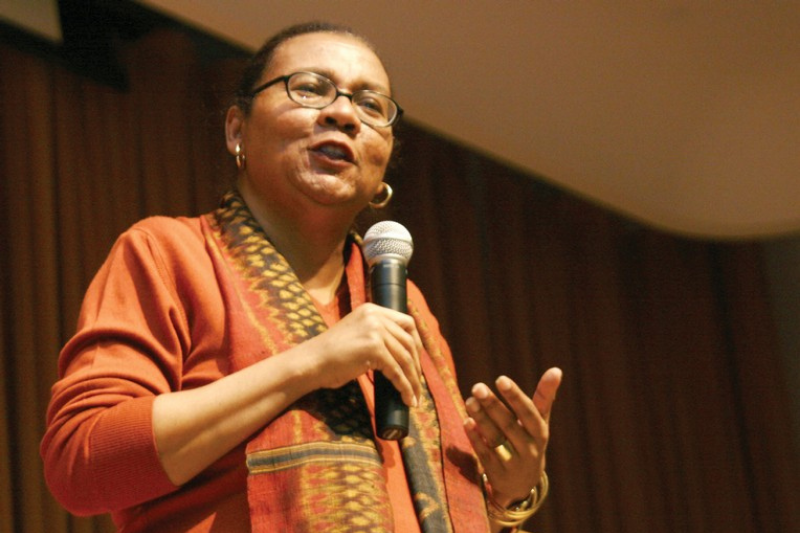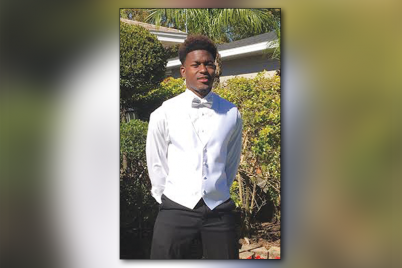Born Gloria Jean Watkins Sept. 25, 1952, in Hopkinsville, Ky., bell hooks went on to become a feminist writer who pushed the bounds of feminism beyond white women and gave voice to Black women.
BY ELYSE VAN BREEMEN, Contributor
bell hooks passed away Dec. 15, 2021, and will be greatly missed. She rose from her early beginnings to a great height.
Born Gloria Jean Watkins Sept. 25, 1952, to a working-class African-American family of six children, her father worked as a janitor, and her mother worked as a maid in the homes of white families. She later chose her maternal great-grandmother’s name as her pen name, as she admired her snappy temper and bold tongue.
She wrote her name in lowercase letters because she wanted people to focus on the substance of her books, not her personal qualities. hooks said of that decision: “When the feminist movement was at its zenith in the late ’60s and early ’70s, there was a lot of moving away from the idea of the person. It was: ‘Let’s talk about the ideas behind the work, and the people matter less.’ It was kind of a gimmicky thing, but lots of feminist women were doing it.”
hooks was an avid reader and loved poets such as William Wordsworth and Elizabeth Barrett Browning. Educated mainly in racially segregated public schools, she later moved to an integrated school in the late 60s and graduated from Hopkinsville High School in Hopkinsville, Ky. She obtained her Bachelor of Arts degree in English from Stanford University in 1973, a Master of Arts in English from the University of Wisconsin-Madison in 1976.
She began writing “Ain’t I a Woman: Black Women and Feminism” in 1971 at 19; it was published in 1981. She spent several years teaching and writing, and then in 1983, completed her doctorate in English at the University of California, Santa Cruz.
hooks was a prolific writer, publishing more than 30 books, many receiving awards. “Ain’t I a Woman?” was recognized for its contribution to feminist thought (the belief in the full economic, political, and social equality of the sexes).
In 1992, Publishers Weekly called it “One of the twenty most influential women’s books in the last 20 years.” Writing in The New York Times in 2019, Min Jin Lee, a recipient of a fellowship in Fiction from the Guggenheim Foundation, said that “Ain’t I a Woman” “remains a radical and relevant work of political theory. hooks lays the groundwork of her feminist theory by giving historical evidence of the specific sexism that black female slaves endured and how that legacy affects black womanhood today.”
“Ain’t I a Woman” explores the historical impact of sexism and racism on Black women, the devaluation of Black womanhood, and how Black women are portrayed in the media. It also examines the education system, the idea of a white-supremacist-capitalist-patriarchy, and the “marginalizing” of Black women, treating them as if they were insignificant.
In 2004, hooks joined Berea College as a Distinguished Professor in Residence. Berea College is the only one of America’s top colleges where no student pays tuition.
hooks was a scholar in residence at The New School, a private research university in New York City, on three occasions, most recently in 2014. Also, in 2014, the bell hooks Institute was founded at Berea College, where she donated her papers in 2017.
She received many awards throughout her career and was inducted into the Kentucky Writers Hall of Fame in 2018. The Atlantic Monthly called her “One of our nation’s leading public intellectuals,” and TIME magazine included her in the “100 Women of the Year” project in 2020.
hooks was creative, dynamic, prolific. She identified and rose above the potential victim and oppressor within. It is a lesson for us all. “There’s no place to go but up,” she told Maya Angelou in a 1998 conversation. “In my work, I constantly say, this is how I fell and this is how I was able to rise. It may be important that you fall. Life is not over. Just don’t let defeat defeat you. See where you are, and then forgive yourself, and get up.”
She spoke of feminism in a broad sense in “Ain’t I A Woman: Black Women and Feminism:”
“It is obvious that many women have appropriated feminism to serve their own ends, especially those white women who have been at the forefront of the movement; but rather than resigning myself to this appropriation, I choose to re-appropriate the term “feminism,” to focus on the fact that to be ‘feminist’ in any authentic sense of the term is to want for all people, female and male, liberation from sexist role patterns, domination, and oppression.”
She spoke of love in a broad sense as well: “Imagine all that would change for the better if every community in our nation had a center that would focus on the practice of love, of loving-kindness.”
In an interview with Jet magazine in 2013, she stated, “We can’t combat white supremacy unless we can teach people to love justice. You have to love justice more than your allegiance to your race, sexuality, and gender. It is about justice.”
In her book, “All About Love: New Visions,” she wrote, “When angels speak of love, they tell us it is only by loving that we enter an earthly paradise. They tell us paradise is our home and love our true destiny.”
She also wrote: “A generous heart is always open, always ready to receive our going and coming. In the midst of such love, we need never fear abandonment. This is the most precious gift true love offers — the experience of knowing we always belong.”
Though bell hooks died, age 69, from kidney failure at her home in Berea, Ky., last month, she lives on through messages such as these and her desire to create a better world.












